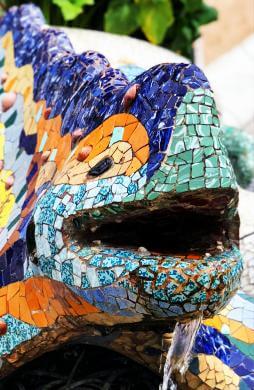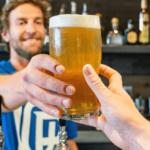
How To Say Cheers In Spanish
THE MOST FAMOUS SPANISH TOASTS FOR DRINKING
If last week we were talking about Spanish French toasts (the edible ones), today we are talking about a different type of toast: the one you say before drinking. Because there’s not only one translation for “Cheers!”. There’s many Spanish cheers sayings: some traditional that work in all occasions, but also some sassy ones only for very informal situations. WARNING: You might not want your kids to read the second part of this post.
The tradition of clinking glasses seems to have started in the Roman times, when it was common to poison people’s drinks to get rid of them. The hosts, to show it was safe to drink, would clink the guests glasses with enough strength to spill some of their drink in the other people’s glasses.
Others say the Bacus, the Roman God of Wine, organized a banquet and invited the 5 senses. When the sense of Hearing complained he couldn’t “hear” the wine, Bacus took him to the cellars to hear the fermentation fizzle. But it wasn’t enough. Then the God suggested to clink the glasses so Hearing could also be engaged in the celebration.

It is also believed that when in 1527 Charles V conquered Rome, his soldiers said it had been God's will, rising their glasses to Him and saying: "Bring dirs" (I offer it to you). It is believed to be the origin of the word "brindis" (toast in Spanish) and the first time a toast was used as a form of celebration and respect.
Spanish drinking toasts for all occasions
1
¡Salud!
It translates as “To your health!”, and it’s a common toast in Latin languages. Apparently the Roman writer Homer in his Iliad already mentions it as wishing health to your mates was a symbol of friendship and good luck.
Other sources say the Romans saw it as a show of respect to their Gods. And some other state it had the superstitious purpose of keeping diseases, bad luck and even evil away. Interestingly, “Salud” is also said when someone sneezes for the same reason, just as the English “Bless you”.
There’s a longer fersion of this Spanish toast, but its use is not as common: “Salud, amor, pesetas y tiempo para disfrutarlos“. Pesetas were the Spanish currency before the euro coin came. So it means “Health, love, money and time to enjoy them”. Such a wise saying!
2
¡Chinchín!
In Spain it’s mostly used in a familiar setting, or with kids. I personally wouldn’t say it in a business meal, not because there’s anything bad with the “chinchin” expression, but because is not formal enough. Saying “salud” is better when you want to give a serious impression.
Do not toast saying “chin-chin” in front of:
- Asian. I haven’t been able to find out what’s the true story, but rumors are that it refers to male or female genitals in either Chinese or Japanese. If you know and can tell me, I’ll be glad to update this post.
- Mexican. It’s too close to “chingar” (their F word).
3
¡Por... (X)!
- ¡Por los aquí presentes! (for those who are here)
- ¡Por nosotros! (to us)
- ¡Por vosotros! (to you)
- ¡Por los novios (to the newly wed)
- ¡Por el homenajeado! (to the honoree)
- ¡Por el ojomeneado! (a silly version of to the honoree, that sounds almost like homenajeado but actually means “mad-eye”)
You can also use “por” to toast to something rather than someone: a new life, a new business, a trip…
4
¡Arriba, abajo, al centro y pa' dentro!
It means “Up, down, center and in”, and comes with a little routine. You say “¡Arriba!…” rising your glass, then “¡Abajo!” lowering it. Then you say “¡Al centro…!” stretching your arm towards the center of the table or circle of drinking friends, and then yell “¡Y pa’ dentroooooooo!” taking the glass to your lips and drinking, if possible in one single shot.
Shameless Catalan toasts
The following ones are not Spanish toasts but toasts in Catalan, the language spoken in Barcelona, the Balearic Islands and the Valencian Community. They can come handy if you are visiting these regions of Spain, and they are quite irreverent but somehow funny.
WARNING: THE NEXT ENTRIES CONTAIN SWEAR WORDS
5
Salut i força al canut!
That’s what many people thinks it means! But I must say… they are wrong. In the old times, when there were no banks, people use to carry their gold inside leather cylinders – the “canuts”. So that’s the cylinder they wanted to be strong. Anyway, life is always about money or sex, isn’t it?
This is a way to say cheers that is informal (so not to be said in business meals), but not really considered disrespectful. You might notice some sniggering around you if you happen to say it in a moment that wasn’t the best, but it’ll be quickly forgotten and forgiven.
6
Sant Hilari, Sant Hilari...!
This is of course a drinking toast for party moments, when getting drunk is one of your goals. And you definitely only say it among friends in very informal situations, not with older family friends or kids because it contains the mother F word. But let’s analyze its content:
“Sant Hilari, Sant Hilari” means “Saint Hilarious, Saint Hilarious”. But why do we say that? I’ve found two theories. One is that in the town near Barcelona called Sant Hilari de Sacalm they celebrate a Festival for the boys coming off age where everybody gets drunk. Fair enough.
Another theory says that when you get drunk you feel hilarity, and that’s what the saying refers to. Okay, could be. To me, the most important thing is that… it rhymes with the rest of the expression! And “Fill de puta qui no se l’acabi” means “MF who doesn’t down it”. Nothing to explain here.
BTW, researching for this post I’ve found there’s a Spanish translation for this toast: “Hidalgo, Hidalgo, hijodeputa el que se deje algo” (“Hidalgo, Hidalgo, MF who leaves anything in the glass”). Which I had never heard in Barcelona but must be common in other areas of Spain. And they say “echar un hidalguito” for downing a drink, just like we say “fer un Sant Hilari”.
7
Brindem, brindem, brindola...
Ok, this is the sassiest toast I know of. One that I’ve only seen men saying, in an informal situation where they feel safe to be fool and irreverent but still make people laugh. The first part of the toast is innocent enough, though. “Brindem, brindem, brindola” invites to toast in an almost childish way. It’s sound something like “Let’s toast, let’s toast, let’s toasteenie”… (sorry, just a weird rhyming end)
And it continues “per les teves mamelles i la meva titola!”. Which means “to your boobs and my weenie!”. And I’m not sure to be using the right words to translate it, but when I hear “mamelles” I think first of cow tits. And it’s the word an uneducated medieval farmer would have used to talk about feminine breast.
As for “titola” is a word mostly used for children and people who don’t want to use the right word for penis but don’t want to use a vulgar word or be too corny either. I’m happy to get suggestions to refine my chosen translation here. The idea I want to convey is that it is vulgar, but not particularly offensive. And it has a foolish touch that makes Catalans laugh.
Spanish drinking toast etiquette
- You don’t toast with an empty glass. It brings you bad luck.
- You don’t toast with water either. It’s also bad luck.
- You look in the eyes of the person you are clinking your glass with. Or you won’t have sex in a while.
- In my family at least, if champagne was spilled over the table, we’d wet the tips of our fingers with it and touch each others foreheads with the wet fingertips. It was said to counteract the bad luck of spilling the sparkling. But I haven’t seen it anywhere else, it might just be a weird family thing…
Music about toasts in Spanish
What are your favorite Spanish cheers?
Marta
MORE BARCELONA TIPS FOR YOU:
SHARE WITH YOUR TRAVEL MATES
RESEARCHING FOR A TRIP IS TIME-CONSUMING…
Need more inspiration?
Our 100% FREE Barcelona Collection will give you everything you need to organize the trip of your lifetime to Barcelona.
BEST INSIDER TIPS FROM THE PROS!

Last update on 2024-04-25 / Affiliate links / Images from Amazon Product Advertising API










